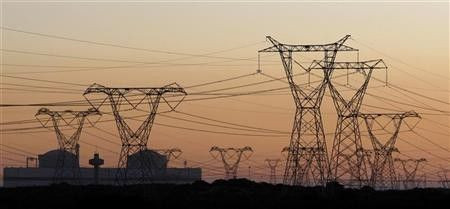Mining surge to worsen Congo power deficit: official

Democratic Republic of Congo will see its energy deficit worsen dramatically in the next four years due to a surge in industrial demand from the mining industry, the country's national supplier said on Tuesday.
The central African state has attracted a flurry of major mining investments as companies seek to develop its vast deposits of copper, cobalt, and other minerals.
The boom in the mining sector, principally in Katanga has led to a spectacluar increase in the demand for electricity, Mbala Musanda, the head of the national supplier, known as SNEL, told a mining conference in Kinshasa.
He said that by 2015 the energy deficit in the country is set to rise to 132 MW from 110 MW this year.
Congo's vast network of rivers has the potential to generate 100,000 MW of hydroelectric power according to the government -- enough to supply much of Africa -- but that potential is largely unexploited and currently only 9 percent of Congo's population has access to power.
Rapid urbanisation caused in part by people fleeing rebel violence in the countryside has also added to the strain on power supplies, Musanda said.
Congo is trying to rebuild its devastated infrastructure after decades of dictatorship and conflict which saw much of its energy sector fall into ruin, with existing hydroelectric plants running at just 44 percent of capacity.
The country is looking for a developer to build the Inga 3 dam on the Congo river, which the authorities hope will generate 4,300 MW and be ready by 2018.
Inga 3 has attracted the interest of the world's largest ming company, BHP Billiton, but plans for a far larger 39,000 MW hydro plant at Inga have stalled.
The government hopes to double the percentage of the population accessing electricity by 2015 but this would cost $6.5 billion according to the chief of staff for the energy ministry, Vika di Panzu.
Panzu said agreements have already been reached with several mining companies including Tenke Fungurume and Anvil, to improve energy infrastructure near their minesites.
Two Egyptian firms, el Sewedy Electric and el Sewedy Electrometer are also in negotiations over deals worth a total of $289 million to provide power to residents in the capital Kinshasa, officials said.
© Copyright Thomson Reuters 2024. All rights reserved.





















